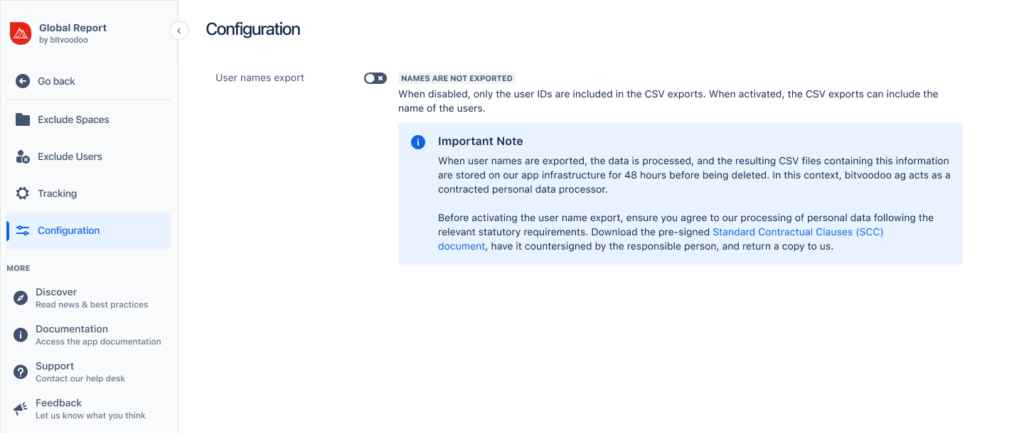Community resources
Community resources
Community resources
From IDs to Names: Introducing Username Export in Viewtracker Cloud
Hello there!
It's Elena from Communardo Products here.
We’ve just rolled out a new feature in Viewtracker Cloud that many of you will find super helpful: Admins can now include user names in CSV exports.
Understanding how your team interacts with Confluence content is essential. Additionally, having access to clear and meaningful data makes all the difference. In Viewtracker Cloud, CSV exports have traditionally included only user IDs, which can make reports harder to interpret or share across teams.
To make reports more readable and actionable, administrators now have the option to include user names in exports. This feature is configurable, providing you with more flexibility in how you analyze and communicate engagement data, whether you’re preparing internal reports, reviewing activity trends, or simply making sense of who’s viewing what.
In this article, you’ll learn how to enable the user name export feature, where to find the setting, and what to consider in terms of privacy and compliance.
Simple Setup in a New Location
To make this change easy to manage, we’ve reorganized the admin section slightly. What was previously labeled “Manage Tracking” is now called “Settings.” Within this updated section, you’ll find a new configuration page that guides you through enabling user name exports.

It’s a simple process. Once enabled, any future exports that include user data will display both user names and IDs. It allows faster analysis and a deeper understanding of how your team interacts with Confluence content.
Transparency and Data Responsibility
Enabling this feature means that Viewtracker will begin processing user names as part of your reports. This only occurs when the setting is enabled and is limited to the scope of your exports. To support your internal compliance processes, we have published the updated SCC (Standard Contractual Clauses) file on our Trust and Security page. This ensures that you have clear documentation outlining how user data is handled and processed.
Designed to be flexible
This feature is completely optional. If your organization prefers to keep report data anonymous, you can continue using the default export format without making any changes. But if you’ve been manually matching user IDs to names outside of the app, or need more transparency in your reports, this update will save time and reduce friction.
We’d love to hear how this update supports your workflow—feel free to share your feedback or questions below!
Was this helpful?
Thanks!
Elena_Communardo Products

About this author
Product Marketing Manager
Communardo
Austria
3 accepted answers
0 comments